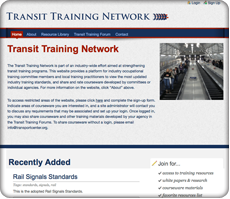Training Needs Assessment
Pinpoint your training needs and design targeted training for your workforce
The Transportation Learning Center can help you determine training needs of your workforce using Skill Gap Analysis:
- Meet with a Labor-Management group to decide which employees to train
- With input from the Labor-Management group, design an assessment that determines the group's knowledge about certain skills and abilities (skills assessed are based on the National Training Standards)
- Analyze the assessment results while preserving the anonymity of the employees who took it
- Based on the assessment results, help design a training plan with input and recommendations from the Labor-Management Group
Several major trends drive a skills crisis in transit: an aging workforce with impending retirements of skilled workers; constantly changing technology; and increasing demands for dependable service as ridership grows.
Your agency faces all those challenges and more. What can you do to make sure that a training program really meets your needs?
To address the issue of a potential skills gap, the Transportation Learning Center has become expert in identifying training priorities for maintenance workers and operators through a data-driven skill gap analysis. A skill gap analysis will examine worker skills and knowledge with regard to various aspects of the workers’ job responsibilities. Workers rate their mastery of their job and the various skills they must have to perform their job effectively and efficiently. The Center then analyzes the workers’ responses and compares the worker’s current capabilities to the knowledge, skills and abilities that someone in that position must have to perform at the highest level of expertise using today’s advanced vehicles.
Read MoreThe tasks and responsibilities in the analysis are based on the national training standards developed by subject matter experts in joint labor-management committees working intensively over several years. The training standards have also been approved as industry standards through APTA’s standard-setting process.
This survey method provides a simple and clear mechanism for comparing current employee knowledge, skills and abilities to industry skill standards. It is a reliable technique for benchmarking job competency skills, assessing individual workers and developing individual and corporate training plans. This method minimizes the questions of reliability and validity associated with other skill surveys, and virtually eliminates concerns related to disparate impact.
The survey results and any other data at the individual level are held in strictest confidence, and that data is not shared beyond the vendor unless the individual worker has given explicit written permission to do so. The final report provides aggregate group results only.
The results of the skill surveys are recorded in a database that allows for analysis and comparison of the data in multiple ways, including by job classification, location and skill set. Because it is impossible to predict exactly what information the gap analysis will yield, the exact format of the gap analysis reports will be determined based on input from the stakeholders.
Once all the steps are completed, the Center holds a closeout meeting with the transit agency, the union leadership, and the training work group to present the results of the skill gap analysis and to help develop training priorities. The final report is delivered within three months of the first meeting.
The Center has administered skills gap analyses at dozens of properties ranging in size from New York City Transit to the Altoona (PA) Metropolitan Transportation Authority (AMTRAN) . We’ve worked in Georgia, upstate New York, California, Utah, New Jersey and Maryland, New Jersey, Ohio and Pennsylvania Pricing will vary depending on the number of employees who are tested and the complexity of the test design. A labor-management partnership must be in place at the agency for this service to be fully effective.
